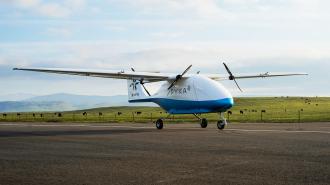World’s largest electric cargo plane can carry up to 400 pounds
California-based startup Pyka has unveiled an autonomous electric cargo plane capable of transporting 400 pounds of cargo 200 miles in less than three hours — opening the door to fast, clean deliveries to remote areas.
The challenge: Getting goods to rural or remote areas is a challenge. Shippers can choose to send cargo via trucks, but depending on how remote the area is, that can take hours or days. Sending it via plane is faster, but also more expensive and worse for the environment.
“We designed this plane to eliminate C02 emissions from the logistics chain.”
Michael Norcia
Drones are a potentially better way to quickly deliver goods to people in remote locations, but most have small payload capacities, and ones that carry more have short ranges — Draganfly’s Heavy Lift drone, for example, can carry 67 pounds, but only for 18 miles.
The electric cargo plane: Pyka has now unveiled the Pelican, an autonomous electric cargo plane with a 200-mile range and a 400-pound cargo capacity. According to Pyka, this makes it the largest zero-emissions cargo plane in the world.
“We designed this plane to eliminate C02 emissions from the logistics chain, while offering a significant speed advantage over ground transportation and operating costs at a fraction of conventional air transportation,” said Pyka CEO Michael Norcia.
The Pelican electric cargo plane has an estimated per hour maintenance cost of just $14.50.
The specs: With a wingspan of 38 feet, the Pelican is about the size of a small private plane, but without a cockpit — its routes are programmed by a controller on the ground, who oversees the vehicle remotely during flight in case anything goes awry.
The Pelican requires a 200-yard runway for takeoff, but it doesn’t have to be paved — the plane can take off from a dirt or grass airstrip. Once in flight, the electric cargo plane has a cruising speed of 70-90 mph. Fully charging the battery from 10% takes 1-3 hours, depending on the charging infrastructure.
All of the plane’s systems are redundant — if something fails, a backup is in place — and Pyka estimates that the Pelican has a per hour maintenance cost of just $14.50 (the total operating cost would have to factor in the price of electricity and the salary paid to remote operators).
Looking ahead: Pyka plans to lease Pelicans, rather than sell them outright, at an undisclosed price. It says three customers have already placed orders for more than 80 of the aircraft, though Norcia did tell Forbes that only a “minority” of the orders are firm with deposits.
As for what the electric cargo plane might be used for and when it’ll start making deliveries: the one confirmed customer, UK operator Skyports Drone Services, plans to begin flying them daily to islands off the UK coast in the second half of 2023.
“We can now fly significant volumes of cargo long distances.”
Alex Brown
At least some of those flights will be for Open Skies Cornwall, a UK-funded project in which drone operators are delivering mail, medical supplies, and more for people and businesses in Cornwall, a county at the southern tip of the UK.
“To date, we’ve been focused on operations with smaller, high value payloads,” said Alex Brown, director of Skyports Drone Services.
“The introduction of the Pelican Cargo brings new capabilities and means we can now fly significant volumes of cargo long distances, connecting communities in remote areas and providing a regular, robust form of transport in and out of hard-to-reach areas,” he continued.
We’d love to hear from you! If you have a comment about this article or if you have a tip for a future Freethink story, please email us at tips@freethink.com.
